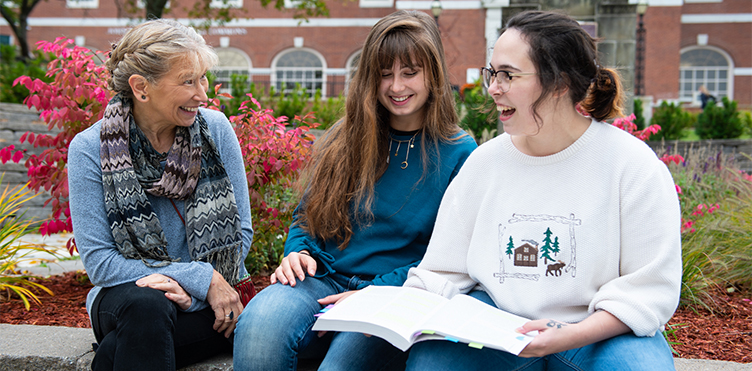Areas of focus

UNB's Climate Change Action Plan has five areas of focus that were defined through extensive public engagement sessions with the UNB community and stakeholders.
Areas of focus
Energy and infrastructure
UNB commits to increasing energy efficiency and reducing fossil fuel consumption on both campuses to reach its carbon-neutral goal by 2050.
UNB plans on making major changes to the infrastructure by 2025 while working to shift the behaviours of the campuses' occupants and increase its users' efficiency.
Existing successes
- The active Energy Management Program on the Fredericton campus saved millions of dollars and increased the energy efficiency
- LEED Gold certified Hans W. Klohn Commons building
- Kinesiology Building built to LEED Gold and WELL certification standards
- Eleven BOMA BESt buildings at UNB Fredericton
- The UNB Fredericton campus received STARS Silver rating
Did you know the building automation system allows the buildings' steam and energy consumption to be tracked on the UNB Fredericton campus?
Improve campus energy systems
- Increase biomass as a fuel source in the Central Heating Plant (FR)
- Invest in renewable energy (FR/SJ)
- Invest in a co-generation system, which uses excess energy from electricity generation to produce steam (FR)
-
Refrigerant phase out (FR/SJ)
Reduce the consumption of energy on campus
- LED retrofit (FR/SJ)
- Building control upgrades (FR/SJ)
-
Reduce energy consumption through occupant education (FR/SJ)
Improve campus infrastructure standards
- Establish an institutional green building policy (FR/SJ)
- Establish preventative maintenance standards (FR/SJ)
-
Upgrade procurement policy to incorporate sustainability (FR/SJ)
Transportation
In the next five years, UNB commits to collect information through a variety of assessments and surveys to address the resistance towards sustainable transportation and understand behaviour patterns.
Existing successes
- UNB Saint John promotes sustainable transportation during its Transportation Month
- UNB Fredericton offers a transportation option within the Department of Civil Engineering as well as an opportunity to study transportation within the Masters of Engineering program
- UNB Saint John's car sharing program promotes carpooling opportunities
- Cyclists can access bike racks on both campuses as well as a bike repair station in front of the Kinesiology Building at UNB Fredericton
Increase the number of active transportation users on campus
- Implement a transportation survey that studies travel methods and behaviours (FR/SJ)
- Development of a transportation plan (FR/SJ)
-
Promote active transportation through increased programming and education (FR)
Reduce emissions produced by campus community
- Conduct a fleet assessment (FR/SJ)
- Develop anti-idling policy (FR/SJ)
- Explore opportunities to reduce daily campus travel (SJ)
- Develop a new sustainable travel policy (FR/SJ)
-
Upgrade and expand video conferencing technology (FR/SJ)
Education and programs
With its successes as a research facility and many academic programs, UNB produces graduates who are prepared to handle the consequences of climate change and hopes to add climate change topics into every faculty on its campuses.
Existing successes
- Publication of the annual institutional Green Review to promote both campuses' sustainability work
- Establishment of the Environment and Natural Resource undergraduate program as well as the Masters of Environmental Management to explore climate change issues and solve complex problems
- Creation of UNB Sustainability (Fredericton) in 2014 to provide various programming on campus
- UNB Saint John's Facilities Management provides the campus with recycling opportunities
- UNB Fredericton's Green Representatives Program offers students the opportunity to be green leaders in their residences
- UNB Fredericton has hosted an annual Sustainability Week since 2018
Creating educational opportunities around climate change
- Integration of climate change into curriculum (FR/SJ)
- Develop a climate change hub (FR/SJ)
-
Explore opportunities for co-curricular partnership (FR/SJ)
Waste management
Regional facilities and pick-up opportunities limit UNB in waste management.
Existing successes
- The Free Cycle room at UNB Saint John collects items which would otherwise be thrown out and allows individuals to take and reuse these items as needed
- Both campuses offer community gardens and partake in small-scale composting
- UNB's Student Union partnered with the Ville to collect student, staff and faculty compost in the fall and deliver it to the Ville's community gardens
- UNB Fredericton is converting all single stream garbage bins to three sort bins (garbage, paper, refundable materials), which translated to a shift in the number of materials recycled
- UNB Saint John continues to recycle all electronic components on campus and ensures the proper disposal of these items
- UNB Fredericton completed a waste audit, with a full picture of the number and types of waste produced on campus
- UNB Saint John has completed preliminary waste assessments
By 2025, UNB would like to explore:
- Alternative opportunities to reduce waste produced on campus
- The types of waste currently produced
-
Opportunities to recycle and reduce the sources of waste
To achieve gains in these areas UNB will:
- Explore opportunities for small unit composting (FR/SJ)
- Explore opportunities to recycle plastics and continue to recycle cardboard and paper (FR/SJ)
- Develop a waste source inventory that highlights the types of waste currently produced (FR/SJ)
-
Develop materials that support waste management education (FR/SJ)
Sustainable grounds
According to its reputation, UNB maintains its grounds to high standards.
Existing successes
- UNB plants approximately 10 trees every year
- UNB Fredericton has a memorial tree trail, a provincial tree trail and an Acadian tree trail
- UNB Fredericton has three wildlife-friendly gardens and a medicine wheel garden
- Both campuses have a community garden on their grounds
By 2025, UNB would like to develop a campus master plan to incorporate the environmental changes anticipated due to increased extreme weather events and temperatures, which also cause new species to thrive in our climate.
Developing a campus master plan
- Integrate tree planting protocol into Campus Master Plan (FR/SJ)
-
Establish a feasibility study for carbon sinks at UNB (FR/SJ)
